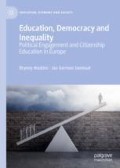Abstract
The concluding chapter states the key argument of the book, the main findings and the implications for policy and practice. The key argument is that growing social disparities in political engagement are primarily the result of unequal access to learning opportunities. Two of the most important learning opportunities are participation in school activities and an open climate of classroom discussion, and children of disadvantaged backgrounds report significantly lower levels of participation in these forms of learning, particularly in England. The chapter calls on policy makers to make these learning opportunities compulsory and recommends schools with a high concentration of low socioeconomic status (SES) children to provide more of them in order to minimise social disparities in access. It further calls on teacher education to include curriculum content on social class.
Access this chapter
Tax calculation will be finalised at checkout
Purchases are for personal use only
Notes
- 1.
Ethnicity, sexuality, gender and disabilities and intersectionality between these groups are equally necessary to take into account.
References
Ainscow, M., Booth, T., & Dyson, A. (2006). Inclusion and the standards agenda: Negotiating policy pressures in England. International Journal of Inclusive Education, 10(4–5), 295–308.
Alexander, R. J. (1999). Culture in pedagogy, pedagogy across cultures. In R. J. Alexander, P. Broadfoot, & D. Phillips (Eds.), Learning from comparing: New directions in comparative educational research (pp. 149–180). Oxford: Symposium Books.
Ben-Porath, S. (2013). Deferring virtue: The new management of students and the civic role of schools. School Field, 11(2), 111–128.
Bischoff, K. (2016). The civic effects of schools: Theory and empirics. Theory and Research in Education, 14(1), 91–106.
Breen, R. (2010). Education expansion and social mobility in the 20th century. Social Force, 89(2), 365–388.
Carrington, S., Mercer, L., Iyer, R., & Selva, G. (2015). The impact of transformative learning in a critical service-learning program on teacher development: Building a foundation for inclusive teaching. Reflective Practice, 16(1), 61–72.
Crosnoe, R. (2009). Low-income students and the socioeconomic composition of public high schools. American Sociological Review, 74(5), 709–730.
Department for Education. (2014). The national curriculum. Retrieved from https://www.gov.uk/national-curriculum/key-stage-3-and-4.
Drummond, M. J., Hart, S., & Swann, M. (2013). An alternative approach to school development: The children are the evidence. Forum Symposium Journals, 55(1), 121–132.
Green, A., Preston, J., & Janmaat, J. G. (2006). Education, equality and social cohesion: A comparative analysis. Basingstoke: Palgrave Macmillan.
Hoskins, B., Kerr, D., & Liu, L. (2016). Citizenship and the economic crisis in Europe: An introduction. Citizenship Teaching & Learning, 11(3), 249–265.
Hoskins, B., Leonard, P., & Wilde, R. J. (2018). Negotiating uncertain economic times: Youth employment strategies in England. British Educational Research Journal, 44(1), 61–79.
Janmaat, J. G., Mostafa, T., & Hoskins, B. (2014). Widening the participation gap: The effect of educational track on reported voting in England. Journal of Adolescence, 37, 473–482.
Leenders, H., Veugelers, W., & De Kat, E. (2008). Teachers’ views on citizenship education in secondary education in the Netherlands. Cambridge Journal of Education, 38(2), 155–170.
Marsh, H. W., Seaton, M., Trautwein, U., Lüdtke, O., Hau, K. T., O’Mara, A. J., & Craven, R. G. (2008). The big-fish–little-pond-effect stands up to critical scrutiny: Implications for theory, methodology, and future research. Educational Psychology Review, 20, 319–350.
Nieuwelink, H., ten Dam, G., & Dekker, P. (2018). Adolescent citizenship and educational track: A qualitative study on the development of views on the common good. Research Papers in Education, 1–16. https://doi.org/10.1080/02671522.2018.1452958.
Nolan, K. (2011). Police in the hallways: Discipline in an urban high school. University of Minnesota Press.
Nolan, K. (2018). I’m a kid from the Bronx: A reflection on the enduring contributions of Willis’s cultural production perspective in Learning to Labour. Ethnography, 19, 464–478.
Reay, D. (2006). The zombie stalking English schools: Social class and educational inequality. British Journal of Educational Studies, 54(3), 288–307.
Swann, C., Keegan, R., Piggott, D., & Crust, L. (2012). A systematic review of the experience, occurrence, and controllability of flow states in elite sport. Psychology of Sport and Exercise, 13, 807–819.
ten Dam, G., & Volman, M. (2003). Life jacket and art of living: Social competency and the reproduction of inequality in education. Curriculum Inquiry, 33(2), 117–138.
Author information
Authors and Affiliations
Corresponding author
Copyright information
© 2019 The Author(s)
About this chapter
Cite this chapter
Hoskins, B., Janmaat, J.G. (2019). Conclusions and Implications for Policy and Practice. In: Education, Democracy and Inequality. Education, Economy and Society. Palgrave Macmillan, London. https://doi.org/10.1057/978-1-137-48976-0_8
Download citation
DOI: https://doi.org/10.1057/978-1-137-48976-0_8
Published:
Publisher Name: Palgrave Macmillan, London
Print ISBN: 978-1-137-48975-3
Online ISBN: 978-1-137-48976-0
eBook Packages: EducationEducation (R0)

